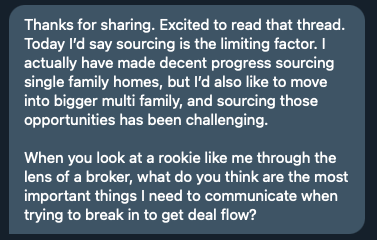
THREAD: Title insurance — profitable cabal or steady workhorse?
Decide for yourself how this industry can pay huge sales commissions while sporting the lowest payout ratio in the insurance sector.
Time for a thread 👇👇👇
Decide for yourself how this industry can pay huge sales commissions while sporting the lowest payout ratio in the insurance sector.
Time for a thread 👇👇👇

Title insurance policy protects the policy holder from financial losses due to defects in title.
For a refresher on title, deeds and why title insurance exists, read this thread.
For a refresher on title, deeds and why title insurance exists, read this thread.
https://twitter.com/evanmr/status/1357003936482304004?s=20
Title insurance covers all sorts of unexpected issues
• Inconsistent wills
• Restrictive covenants
• Missing or flawed records
• Ownership by another party
• Incorrect signatures, forgery and fraud
• Encumbrances and judgements against the property
• Inconsistent wills
• Restrictive covenants
• Missing or flawed records
• Ownership by another party
• Incorrect signatures, forgery and fraud
• Encumbrances and judgements against the property
There are two separate policies: one for the owner and one for the lender.
All lenders require the borrower to purchase a loan policy.
Since most real estate transactions involve a mortgage, title insurance is effectively required.
All lenders require the borrower to purchase a loan policy.
Since most real estate transactions involve a mortgage, title insurance is effectively required.
Why do you need to buy two separate policies to cover the same property?
The policies are extremely similar, but not identical.
There are cases that would only be covered by one policy and not the other.
The policies are extremely similar, but not identical.
There are cases that would only be covered by one policy and not the other.
In some ways, title insurance is cheap. Pricing is regulated by each state and in Texas it would cost
• $1,720 on a $270,000 home
• ~$40,000 on a $10M apartment building
That's only ~0.5% of the purchase price.
• $1,720 on a $270,000 home
• ~$40,000 on a $10M apartment building
That's only ~0.5% of the purchase price.
https://twitter.com/evanmr/status/1354113376528392194
If pricing were tight, you wouldn't expect these facts to be true
• Only ~5% of premiums collected are paid out in claims. In contrast, GEICO pays out ~75%.
• The title agent receives 70 - 85% of the premium as commission.
• Only ~5% of premiums collected are paid out in claims. In contrast, GEICO pays out ~75%.
• The title agent receives 70 - 85% of the premium as commission.
https://twitter.com/evanmr/status/1354113880927080450
For an insurance company to pay out such a small percentage of premiums (the "loss ratio") means that
• premiums are high; and/or
• claims are rare
Insiders will say claims are rare because of the work they do upfront to mitigate risk. That's definitely part of the story.
• premiums are high; and/or
• claims are rare
Insiders will say claims are rare because of the work they do upfront to mitigate risk. That's definitely part of the story.
Title policies last forever, so the title agent performs preventative and curative work that minimizes future losses.
Many issues are handled behind-the-scenes by the title company.
Others result in exclusions to coverage.
In the worst case, the policy will not written.
Many issues are handled behind-the-scenes by the title company.
Others result in exclusions to coverage.
In the worst case, the policy will not written.
Title insurance is not alone in its emphasis of inspection and diligence on the front end.
Yet its loss ratio is far lower than its peers. For example, boiler insurance has a loss ratio of 40-50%.
So it doesn't add up that diligence alone accounts for the low loss ratio.
Yet its loss ratio is far lower than its peers. For example, boiler insurance has a loss ratio of 40-50%.
So it doesn't add up that diligence alone accounts for the low loss ratio.
What about pricing?
The title industry is an oligopoly, with four companies controlling 80% of the market.
In economics, oligopolies are known for price-fixing. Indeed, prices are fixed by the state insurance commissioners.
Yet who influences the insurance commission?
The title industry is an oligopoly, with four companies controlling 80% of the market.
In economics, oligopolies are known for price-fixing. Indeed, prices are fixed by the state insurance commissioners.
Yet who influences the insurance commission?
A lot is made of the fact that title insurance is a one-time purchase that lasts forever.
But that's not quite true.
Every time property is bought and sold, the title company issues a new owner policy and collects more premium.
Plus, their risk on the old policy is eliminated.
But that's not quite true.
Every time property is bought and sold, the title company issues a new owner policy and collects more premium.
Plus, their risk on the old policy is eliminated.
When a loan is refinanced, a new loan policy is issued.
Even with a reissue discount of ~50%, it's still a bonanza for title insurers. There's almost no incremental risk.
Falling interest rate environment => more refinance activity => windfall title insurance profits
Even with a reissue discount of ~50%, it's still a bonanza for title insurers. There's almost no incremental risk.
Falling interest rate environment => more refinance activity => windfall title insurance profits
What about high title agent commissions?
The industry explanation is that the agent does most of the work and takes most of the risk.
There is truth to this.
The title agent does the legwork and assumes liability for claims due to their own errors and omissions.
The industry explanation is that the agent does most of the work and takes most of the risk.
There is truth to this.
The title agent does the legwork and assumes liability for claims due to their own errors and omissions.
One thing is for sure: there's a lot of money in title insurance.
Technology has brought down the underwriting cost considerably, and will consider to do so.
One day, those savings will be passed onto consumers ...
If you're working on this, get in touch with me!
Technology has brought down the underwriting cost considerably, and will consider to do so.
One day, those savings will be passed onto consumers ...
If you're working on this, get in touch with me!
If you enjoyed this thread and want more content like this
• Follow me
• Subscribe to my newsletter. I'll be posting deep dives on tech, real estate, and business.
• A RT is the greatest compliment.
bytestobricks.substack.com
• Follow me
• Subscribe to my newsletter. I'll be posting deep dives on tech, real estate, and business.
• A RT is the greatest compliment.
bytestobricks.substack.com
• • •
Missing some Tweet in this thread? You can try to
force a refresh









